The future of work will be flexible. A hybrid model of remote and office work will be the norm. Productivity will be based on the output and impact, not hours worked. Leadership will be redefined with emphasis on soft skills, empathy, and emotional intelligence. Upskilling will be continuous, and we will all learn to learn. The future of work will reset the meaning of normal and employers will be in the driving seat of this transformation. These are the main conclusions from our global survey of CEOs, leaders, and employees.
June 30, 2020
It is true that most of us have experienced the impact of coronavirus first hand, and that we can point to what has changed for us individually, but little research has been done to trace the overall structural changes to the new world of work. To close this knowledge gap and to provide businesses and employees with concrete data, we surveyed 8,000 leaders and workers from eight countries, including the USA, Germany, Japan, and Australia, and asked how they would like to work after coronavirus.
Here are five facts they told us that you should know about:
According to our research, 3 in 4 employees would appreciate more flexibility and a mix of office-based and remote working. When deciding how exactly to split the time between the office and working remotely, the consensus is half and half. This is consistent across all age groups, countries, as well as workers with and without children.
Here are five facts they told us that you should know about:
#1. “Hybrid working” is here to stay as employees call for more flexibility
According to our research, 3 in 4 employees would appreciate more flexibility and a mix of office-based and remote working. When deciding how exactly to split the time between the office and working remotely, the consensus is half and half. This is consistent across all age groups, countries, as well as workers with and without children.
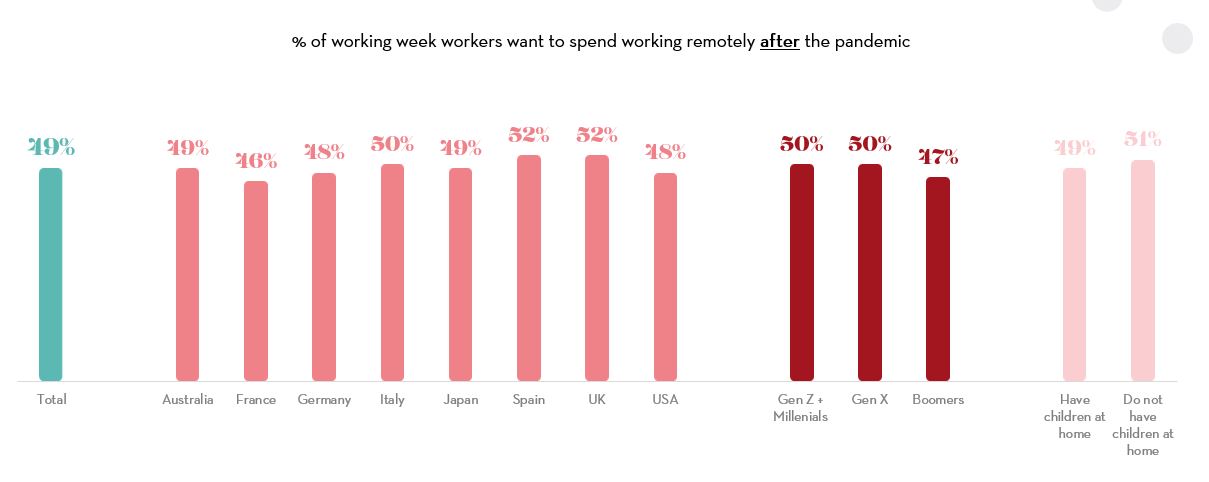
Furthermore, 8 in 10 (79%) C-level executives believe that businesses will benefit from increased flexibility. Organisations should not be afraid to embrace flexibility – rather, the evidence suggests that the role of the physical office will remain important in a post-COVID-19 world.
Half of those surveyed said their work-life balance has improved as a result of the pandemic. One of the explanations has to do with the fact that as remote work became more prevalent, many workers were given more autonomy over their own work schedules.
#2. The end of 9-5? Tracking results, not hours, emerges as a new way of measuring productivity
Half of those surveyed said their work-life balance has improved as a result of the pandemic. One of the explanations has to do with the fact that as remote work became more prevalent, many workers were given more autonomy over their own work schedules.
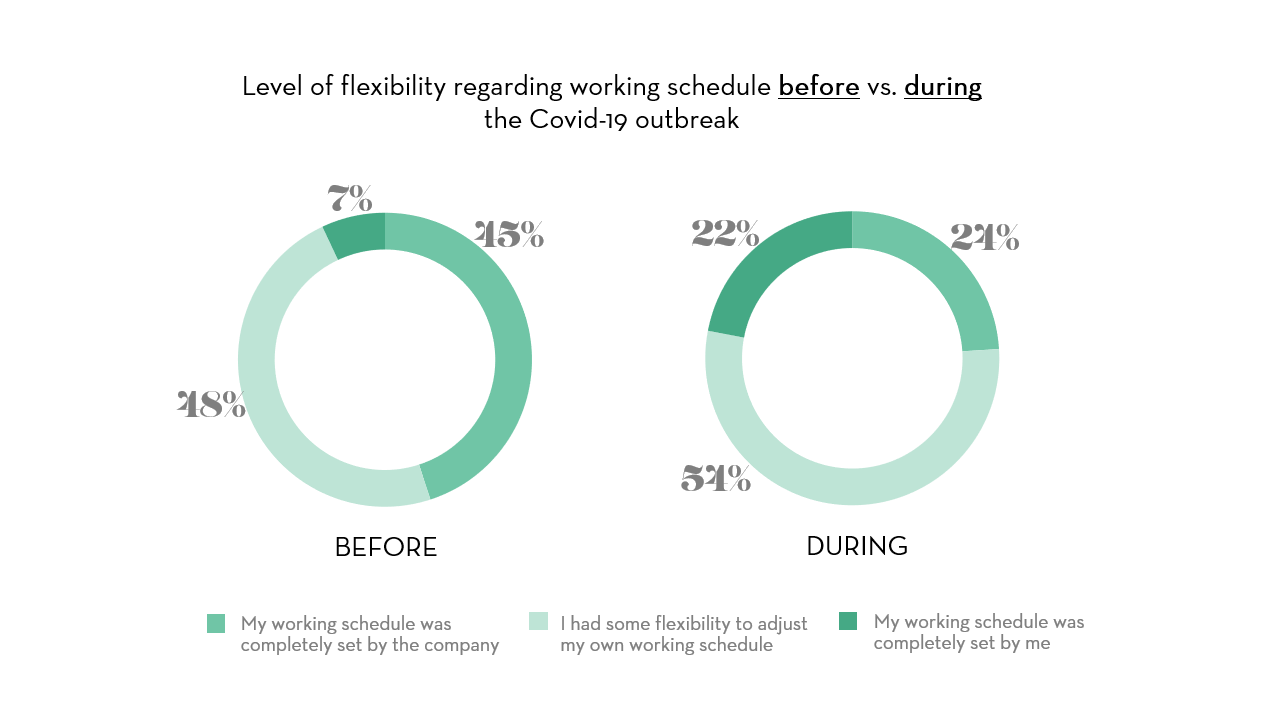
And this is something that workers would like to keep – 75% say it is important for companies to retain this flexibility, not roll it back. There is also a clear view by over two-thirds (69%) of employees that their contracts should be based on meeting the needs of the business than on the hours they work. And 76% executives agree, signaling a likely upcoming shift in how productivity is measured.
More flexibility at work will also require a change to how managers guide their teams and how CEOs lead their companies. Greater emphasis on soft skills such as empathy and trust will be needed to meet rising expectations on employee wellbeing and culture building.
#3. Reinventing leadership: emotional intelligence is the new gold standard, but leaders are not currently well-equipped
More flexibility at work will also require a change to how managers guide their teams and how CEOs lead their companies. Greater emphasis on soft skills such as empathy and trust will be needed to meet rising expectations on employee wellbeing and culture building.
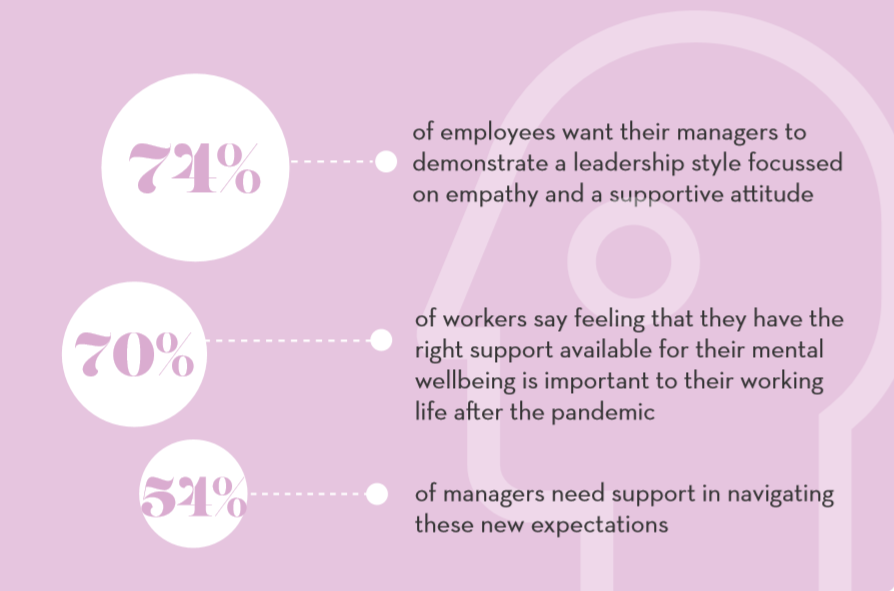
However, important as these new skills are, many leaders do not feel comfortable to lead with emotional intelligence. More than half (54%) need support to be able to navigate these new expectations – and only 12% excelled in supporting employees holistically during the pandemic. Given that the expectations on leaders have changed, it is necessary that organisations invest in soft skills development for managers and executives to rise to the challenge.
But skills development in this new era will have to go deeper than management and leadership. COVID-19 has upskilled many workers, especially in the domain of digital skills. Six in 10 (59%) said their digital or remote working skills improved during the pandemic. But this experience has now created even more appetite for up and reskilling.
#4. The new era of work will require new skills
But skills development in this new era will have to go deeper than management and leadership. COVID-19 has upskilled many workers, especially in the domain of digital skills. Six in 10 (59%) said their digital or remote working skills improved during the pandemic. But this experience has now created even more appetite for up and reskilling.
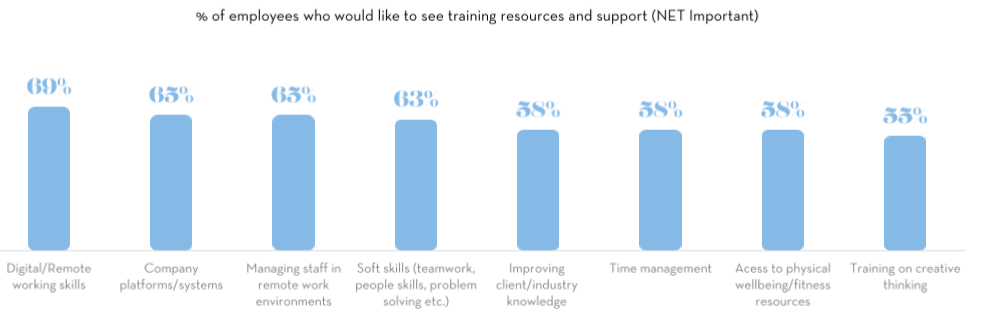
Among the skills most in demand we find that two-thirds of employees would like to see training in soft skills as well as in digital and remote working skills. Businesses will be under increasing pressure to deliver on skills development. This is particularly true when we factor in the widening skills gap and the fact that 1 in 3 employees (34%) have expressed willingness to change jobs and go work for someone else in the same sector if there was an opportunity to learn new skills. As digitisation accelerates post-pandemic, lifelong learning and constant upskilling will be a theme in tomorrow’s workplaces.
One of the most essential questions, when it comes to resetting normal, is who will be primarily responsible for delivering all the above. While policy-makers and individuals will certainly play a role, employers appear to be the most trusted to usher in the new era of work. On average, 80% of those surveyed believe their employer should be in the driving seat of the implementation of the future of work – compared with 73% who say the same about their government, 72% about themselves, and 63% about unions.
#5. Companies are the most trusted to “reset normal” and usher in the new era of work
One of the most essential questions, when it comes to resetting normal, is who will be primarily responsible for delivering all the above. While policy-makers and individuals will certainly play a role, employers appear to be the most trusted to usher in the new era of work. On average, 80% of those surveyed believe their employer should be in the driving seat of the implementation of the future of work – compared with 73% who say the same about their government, 72% about themselves, and 63% about unions.
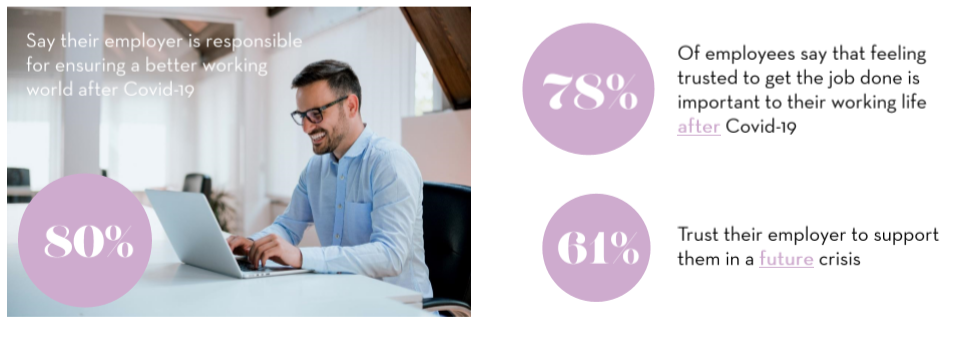
But trust is a two-way street; almost as many people (78%) who put faith in their employers to deliver on the new era of work say that feeling trusted to get the job done is important to their working life after COVID-19.
No doubt, the future of work will require a lot of change – a change prompted and accelerated by the coronavirus pandemic and driven by many rising expectations. To turn these expectations into a more permanent reality, businesses will be asked to show leadership – one that will embrace flexibility, put wellbeing and soft skills to the fore, and where trust will form the foundation of cooperation.
No doubt, the future of work will require a lot of change – a change prompted and accelerated by the coronavirus pandemic and driven by many rising expectations. To turn these expectations into a more permanent reality, businesses will be asked to show leadership – one that will embrace flexibility, put wellbeing and soft skills to the fore, and where trust will form the foundation of cooperation.



